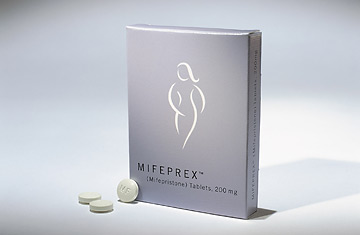
The abortion pill known as RU-486
Though the first documented medical abortion in the U.S. dates back to 1950, it wasn't until 2000 that the Food and Drug Administration approved the contentious medical-abortion drug, mifepristone (still commonly referred to by its clinical-trial designation, RU-486), as an alternative to the conventional surgical procedure. Since then, more than 500,000 U.S. women — and millions more worldwide — have used mifepristone to terminate pregnancy. Now a new study appearing in the August 16 issue of the New England Journal of Medicine reports that the drug, at least in the long term, is safe.
The new paper contradicts an earlier study, of women in the Auvergne region of France, published in 2003 in the American Journal of Epidemiology, which found an association between medical abortion and a nearly threefold greater risk of ectopic pregnancy — a condition that accounts for about 9% of all pregnancy-related deaths in the U.S. "We were kind of concerned, and we wanted to either confirm or refute these previous findings," says Dr. Jun Zhang, a senior investigator and epidemiologist at the National Institute of Child Health and Human Development and co-author of the current study, because "the number of women who have had medical abortions is staggering both worldwide and in the U.S."
Though the rate of abortion has generally been dropping since the mid-1990s, U.S. doctors still perform nearly 1.3 million abortions a year, and the percentage of those using mifepristone continues to increase. According to a recent report from the Guttmacher Institute, "at one large network of providers, the proportion of early abortions performed with mifepristone increased from 9% of eligible women in 2001 to 24% in 2004."
Relying on abortion and pregnancy data on more than 11,600 women from the Danish National Patient Registry, Zhang and colleagues at the University of California, Los Angeles, and Aarhus University in Denmark, analyzed the impact of an early first-trimester abortion — using drugs versus surgery — on women's long-term reproductive health. After adjusting for variables such as maternal age, number of births prior to abortion and gestational age at the time of abortion, researchers found no increase in risk of ectopic pregnancy, miscarriage, premature birth or low birth weight in the medication group, as compared with the women who got surgical abortions. In both groups, ectopic pregnancies occurred about 2.4% of the time; miscarriages occurred about 12.5% of the time.
Why the disparity between the new results and the earlier study? Zhang points to the small sample size and self-reported data in the earlier study, compared with Zhang's large cohort and national-registry information. What's more, the focus of the previous study was not abortion per se, but general risk factors for ectopic pregnancy, including women's history of smoking and pelvic infectious disease. "In some ways, they found this association accidentally," says Zhang, "and the author did not provide any explanation. We weren't sure whether that finding was just by chance or whether it was real."
The current data show that women who use mifepristone are no better or worse off than those who choose surgical abortion, but the study didn't measure either group against women who have never had an abortion. Most existing research shows that surgical abortions have no effect on overall health risks, but the research findings on medical abortions are slim. One other paper, a Chinese study published in 2004, also in the American Journal of Epidemiology compared three groups of women — those who had no abortion, one surgical abortion or one medical abortion — and found no difference among them in risk of low birth weight or premature birth.
Apart from the long-term health effects of RU-486, some doctors still question the drug's safety in the short term. Between 2003 and 2006, seven women — six in the U.S. and one in Canada — died after using mifepristone together with misoprostol, or misoprostol alone. The two drugs are routinely prescribed in combination; the first terminates the pregnancy, while the second causes uterine contractions and expels it. Most of the women died from infection with a dangerous, rare bacterium called Clostridium sordellii, one of the Clostridium species that may normally live in the vagina of healthy, non-pregnant women. Most also took misoprostol vaginally — many doctors prescribe it that way, though the drug is federally approved to be taken by mouth. But there is no evidence to date that the abortion drugs or how they were administered increased the women's vulnerability to the bug.
